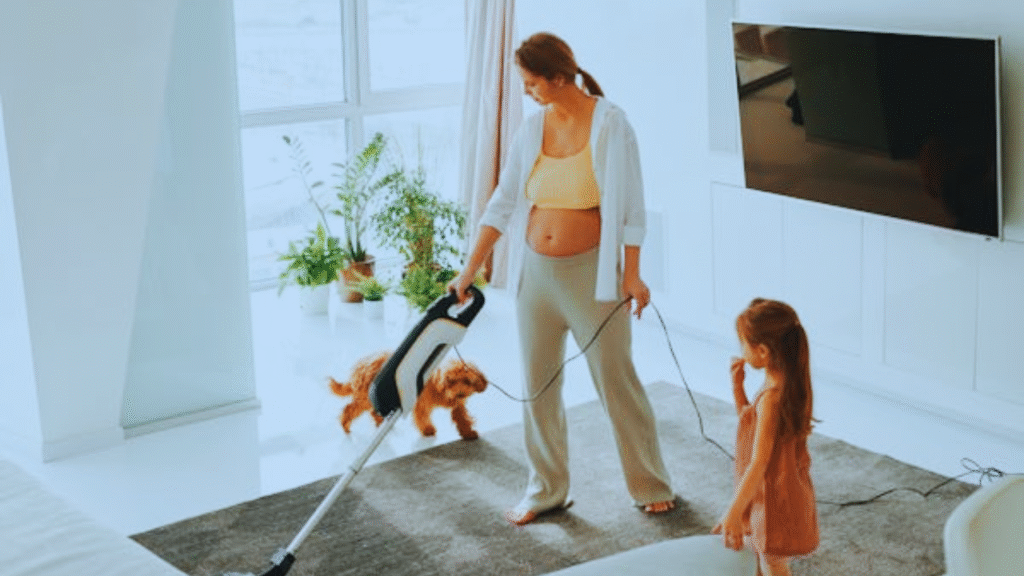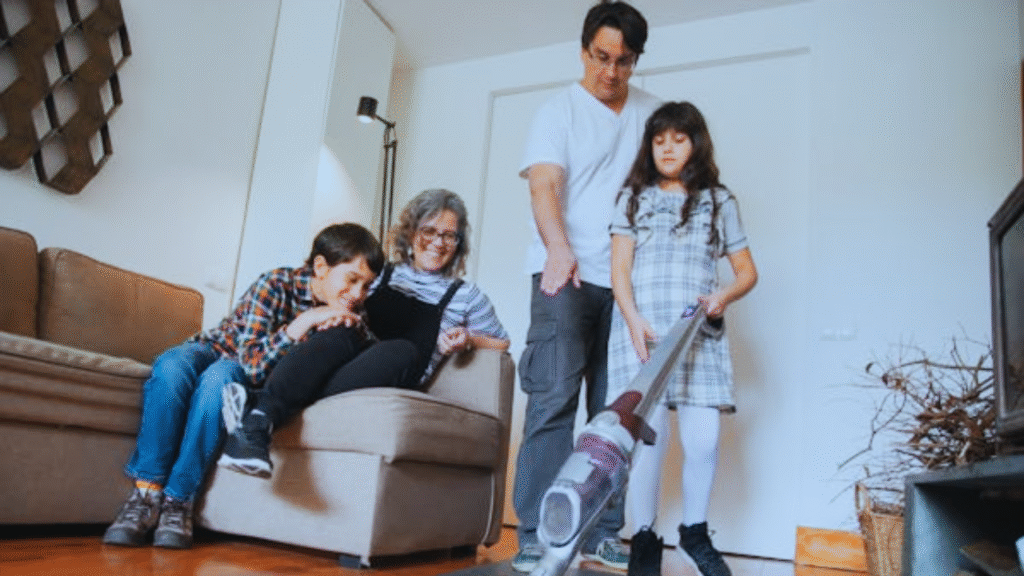The concept of the ‘invisible burden’ embodies the often unseen emotional and mental load carried by mothers. This phenomenon arises from societal expectations that have historically placed women in the primary role of caregivers and homemakers. As a result, moms are continually expected to juggle household chores alongside parenting responsibilities, often leading to the perception that they are always cleaning. This expectation is not only unrealistic but also contributes to a significant amount of stress and anxiety for mothers.
While traditional gender roles have evolved over the years, the burden of maintaining a household frequently persists for many moms. This leads to the emotional labor that goes unnoticed by others, including family members. Moms continually assess their surroundings, identify tasks that need to be completed, and often initiate these tasks without formal acknowledgment or support. These responsibilities can range from cleaning the house and organizing family schedules to ensuring that everyone is well-fed and cared for, creating an accumulation of pressure that can be overwhelming.
The emotional aspect of this burden is profound. Moms frequently experience feelings of guilt when tasks are left undone or when they take time for self-care. The weight of these expectations can lead to burnout, anxiety, and a diminished sense of self-worth. Society often overlooks these challenges faced by mothers, perpetuating the notion that it is inherently their duty to keep the home running smoothly. Furthermore, when this cycle continues unaddressed, children grow up with the same ingrained expectations, further entrenching the burden of household maintenance as a female responsibility.
Ultimately, recognizing the invisible burden is the first step toward paving the way for a supportive environment. A collective effort is essential to balance responsibilities among family members and relieve moms of the constant pressure of always cleaning, enhancing overall family dynamics and well-being.
Statistical Insights into Mothers and Housework

The role of mothers in household management continues to be a significant topic in discussions about family dynamics and gender equality. Recent research highlights a stark contrast in the amount of time mothers dedicate to cleaning and other domestic responsibilities compared to fathers and other family members. According to a survey conducted by the Pew Research Center, mothers on average spend approximately 2.5 hours per day on housework, which includes cleaning, cooking, and caregiving. This statistic indicates that moms always cleaning is not just a stereotype, but a reality for many families.
To provide further context, studies have shown that fathers typically allocate around 1.5 hours per day to similar tasks, illustrating a notable imbalance in the domestic workload. This discrepancy in time investment leads to mothers bearing a disproportionate share of household management duties. In fact, research published in the Journal of Marriage and Family indicates that even when both parents are employed full-time, mothers often still engage in the majority of housework, further emphasizing the persistent societal expectations surrounding gender roles. It is estimated that mothers perform upwards of 70% of the home cleaning, which reinforces the notion that the burden often falls disproportionately on them.
Moreover, data from the American Time Use Survey reveals that single mothers experience an even more significant challenge, with their cleaning and household responsibilities consuming about 3 hours daily. This additional burden can contribute to feelings of exhaustion and stress, as these moms juggle the demands of work and family life. Understanding these statistics can facilitate a greater awareness of the challenges mothers face and underscore the importance of shared responsibilities within households. Recognizing the disparity in how mothers manage housework is a crucial step toward fostering equitable domestic partnerships and alleviating the invisible burden that so many moms carry.
Cultural Expectations and Historical Context

The relentless cycle of household cleaning and maintenance often falls disproportionately on mothers, a pattern that can be traced through cultural and historical contexts. Traditionally, societal norms have positioned women as primary caregivers and homemakers, a role that has long been associated with the need for cleanliness and order. This historical framework stems from a time when women were expected to manage the home, raising children while ensuring the living space was pristine. Such expectations have not fully dissipated and continue to influence the perceptions of motherhood in contemporary society.
Roles
As gender roles have evolved, with more women entering the workforce and taking on additional duties outside the home, the traditional views regarding household responsibilities remain pervasive. Mothers frequently find themselves juggling work and family obligations, leading to an unending cycle of cleaning and maintenance tasks. The expectation that “moms always cleaning” is not merely a stereotype; it is deeply embedded in the societal fabric that delineates roles within families. While there have been significant advancements in women’s rights and gender equality, the legacy of these conventional expectations still affects how mothers are perceived and what is expected of them in their roles.
Psychological impacts can also be observed as moms tend to often feel a sense of guilt or anxiety if their living environment does not meet these cultural standards. This pressure is exacerbated by social media, where curated images of impeccably maintained homes contribute to unrealistic benchmarks for cleanliness. Thus, the evolving yet persistent cultural narrative around motherhood and household labor creates a scenario where moms are continuously engaged in cleaning, often at the expense of their own well-being. Addressing these deeply ingrained cultural expectations will require a collective rethinking of gender roles within domestic spheres and society at large, championing a more equitable sharing of responsibilities amongst all family members.
The Emotional Toll of Cleaning

The role of mothers is often characterized by a perpetual cycle of domestic responsibilities, one of the most prominent being the act of cleaning. This constant obligation not only demands physical exertion but also takes a significant emotional toll on their well-being. Many mothers find themselves stressed and overwhelmed by the expectation to maintain an immaculate home. The perception that moms always cleaning equates to their worthiness as caregivers can lead to increased anxiety and feelings of inadequacy.
Societal pressures and the idealization of a spotless household can create an environment where mothers feel compelled to meet unrealistic standards. This pressure can escalate to chronic stress, as they juggle multiple tasks while striving to maintain order and cleanliness. The inability to keep up with these demands may result in feelings of failure, compounding their emotional burden. In some cases, these overwhelming responsibilities can lead to burnout, where the physical fatigue transforms into emotional exhaustion, affecting their overall mental health.
Moreover, the efforts of moms seldom receive the recognition they deserve. The daily commitment to cleaning and tidying up often goes unnoticed, leaving mothers feeling undervalued. This lack of appreciation can contribute to their emotional distress, making them question their contributions to the household. A cycle of self-doubt and discontent may develop, as they measure their worth by the cleanliness of their environment, which is an unrealistic and damaging narrative.
Ultimately, it is important to acknowledge the emotional burden that accompanies the role of a mother who is continually cleaning. By recognizing and addressing these feelings, we can work towards creating a supportive atmosphere that alleviates the pressures placed on mothers, allowing for healthier mental states and a more balanced approach to managing household responsibilities.
Changing Mindsets: The Role of Family Dynamics

The traditional view of household responsibilities often positions mothers as the primary caretakers and cleaners in the home. This perception can create an invisible burden, wherein moms are always cleaning, leading to feelings of overwhelm and exhaustion. However, with shifting family dynamics, there is an opportunity to redefine roles and responsibilities within the household. Open communication and shared responsibility play crucial roles in effectively alleviating the pressure that many mothers face.
A proactive approach begins with initiating conversations among family members about the distribution of household chores. By discussing the importance of teamwork, families can foster a sense of shared ownership over the cleanliness of their living space. This not only helps lighten the load on moms, but it also promotes a collaborative environment where children and partners learn the significance of contributing to the household. Assigning age-appropriate tasks to children can instill a sense of responsibility early on, ultimately leading to more balanced cleaning habits as they grow older.
Schedule
Moreover, setting clear expectations and establishing a chore schedule can further facilitate cooperation within the family. Utilizing tools such as chore charts or apps can improve visibility and accountability for each member’s contributions. This practice encourages individuals to recognize their role in maintaining the home, thereby supporting moms in reducing their cleaning burden. Underlying this shift is the essential concept of respect; recognizing that all household members deserve a clean environment and that maintaining it is a shared responsibility.
In conclusion, transforming family dynamics through shared responsibility and open communication can significantly alleviate the cleaning burden that many moms carry. By fostering teamwork in maintaining a clean home, families can create a supportive environment, ultimately ensuring that the task of cleaning does not rest solely upon the shoulders of mothers. This approach not only benefits moms but also enriches family bonds and teaches valuable life skills to children.
Professional Cleaning Services: A Viable Solution

For many mothers, the constant responsibility of maintaining a clean home can be overwhelming. The perception that moms are always cleaning can lead to increased stress and diminished mental well-being. A practical solution to alleviate this burden is the employment of professional cleaning services. By outsourcing household chores, mothers can reclaim valuable time that can be devoted to their families and personal well-being.
One of the primary benefits of hiring professional cleaners is the significant reduction in daily household tasks. These services can take care of regular chores, including vacuuming, dusting, and deep cleaning, allowing moms to step back and enjoy more quality time with their children or engage in activities that promote their mental health. Instead of juggling numerous cleaning duties, they can relax, engage in hobbies, or simply enjoy peaceful moments.
Moreover, professional cleaning services bring an added layer of expertise and efficiency to the cleaning process. Trained cleaners have access to specialized tools and products designed to tackle various household challenges effectively. This expertise results in a deeper clean than what is often achievable in the limited time moms have available for cleaning. As a result, homes not only look cleaner, but they also become healthier environments for families.
Psychological Benefits
Additionally, the psychological benefits of delegating cleaning responsibilities should not be underestimated. When moms are no longer always cleaning, they can gain a sense of empowerment and relief, which positively impacts their overall mood and well-being. These small changes can lead to better family dynamics, as mothers who are less burdened by cleaning chores are likely to engage more positively with their children and partner.
In conclusion, utilizing professional cleaning services presents a viable solution to ease the heavy load often carried by mothers. By outsourcing these chores, moms can enhance their mental health, enjoy quality family time, and create a more harmonious household environment.
Technology and Smart Solutions for Home Management

In today’s fast-paced world, the integration of technology into home management has become a valuable ally for families, particularly for mothers who find themselves in the perpetual cycle of home upkeep. As moms always cleaning often juggle multiple responsibilities, the advent of smart home devices and management apps offers a practical solution to ease this burden. These innovative tools not only streamline chores but also promote a collaborative atmosphere within the household.
Smart home devices such as robotic vacuum cleaners play a critical role in minimizing cleaning efforts. By autonomously navigating and tidying up floors, these devices allow mothers to focus on other pressing tasks while ensuring cleanliness. Similarly, smart washing machines and dishwashers can be programmed to operate during off-peak hours, effectively saving time and energy, thereby making the daily routine of moms always cleaning less tedious.
Additionally, technology-driven home management applications serve as virtual assistants, helping families coordinate schedules and assign tasks efficiently. With these apps, mothers can create cleaning chore charts that distribute responsibilities among family members, encouraging participation rather than leaving all duties to one person. Notifications and reminders can help keep everyone accountable, making it less likely for chores to pile up.
Moreover, the utilization of smart assistants, such as Amazon Alexa or Google Home, can assist in managing day-to-day cleaning activities. Voice-activated commands allow mothers to update to-do lists, set timers for tasks, or even play motivating music while cleaning, which fosters a positive atmosphere. Thus, through technology-driven solutions, the daunting task of maintaining a clean home can be transformed into a team effort that alleviates the pressure on mothers, making the process more enjoyable and efficient.
Creating a Community Support System

In contemporary society, the role of mothers often extends beyond caregiving and nurturing; many find themselves trapped in a continual cycle of cleaning and maintenance. This situation can lead to overwhelming stress and isolation. As such, fostering a community support system is essential for alleviating this invisible burden moms always cleaning experience. By forming and participating in collective efforts, mothers can greatly enhance their quality of life and share responsibilities more equitably.
Support groups present an excellent opportunity for mothers to connect with others facing similar challenges. These networks allow for the exchange of practical advice, emotional support, and even collaborative cleaning efforts. For instance, moms can schedule designated cleaning days where they gather with friends or family members. Duties can be shared, transforming a typically solitary chore into a communal activity, thereby making cleaning more manageable and less overwhelming.
Moreover, promoting a culture of helping one another can significantly reduce the burden on individual mothers. By inviting friends and relatives to contribute, whether through direct assistance or sharing resources, mothers can develop a more supportive environment. Simple gestures, such as inviting other moms over for a cleaning session in exchange for a meal or playdate, can foster stronger relationships and provide much-needed relief. Engaging in such shared experiences not only lightens the load but also builds camaraderie among mothers, helping to create lasting friendships.
The importance of a supportive community cannot be overstated. As mothers collaborate on cleaning tasks and share their experiences, they can mitigate feelings of isolation and build a nurturing space that benefits all. By developing these communal bonds, moms not only tackle cleaning responsibilities but also cultivate resilience and a sense of belonging. This approach ultimately allows mothers to reclaim their time and energy for more fulfilling pursuits beyond household chores.
Steps Toward Change by 2025

The issue of moms always cleaning reflects a deep-rooted societal pattern that necessitates urgent action. To alleviate this invisible burden, families, communities, and society at large must collaborate to foster an equitable distribution of household responsibilities. The following are actionable steps that can significantly contribute to this change by the year 2025.
First and foremost, it is essential to initiate open conversations within families about the division of household chores. Setting aside time for family discussions can help everyone understand the pressures faced by the primary caregivers. Parents should model equitable sharing of responsibilities, enabling children to learn the importance of maintaining a clean and organized home. Educational initiatives in schools can also help young individuals recognize the value of teamwork and shared responsibilities.
Communities can play an instrumental role by organizing workshops and programs aimed at educating families about the emotional and physical toll that falls disproportionately upon mothers. Local community centers can offer resources and support groups where mothers can share their experiences and strategies for achieving a balanced home life. Such environments encourage collective efforts in managing household tasks.
Businesses and employers have an important part to play as well. By introducing flexible work policies, they can allow parents to manage their work-life balance better. Encouraging paternal involvement in household duties through company culture will also promote a shared responsibility model, benefitting all involved.
Ultimately, addressing the challenge of moms always cleaning requires a united approach. By committing to support one another—be it through open communication, community initiatives, or workplace reforms—we can create an environment where responsibilities are shared more equitably. These collective efforts will not only lighten the burden on mothers but also foster a more harmonious familial and societal structure as we move toward 2025.
